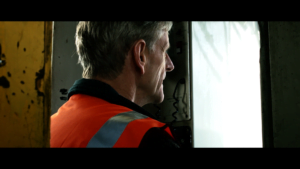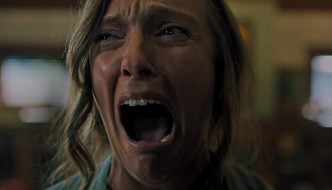
Loco (Dir. Rory Wilson). Source: BFI
Liverpool-born Rory Wilson, who recently won ‘Best Film’ at the BFI Future Film Festival, is just 25 years old. His winning short film, ‘Loco’, explores the unspoken truth about the dark realities behind being a train driver, and follows one driver’s harrowing experience on the tracks.
“This is the first big thing I have achieved as a film maker,” he says, “it’s made me want to take film making to the next level, and myself more seriously, to really build on this award.” Wilson also had one of his films screened last year – “it is an incredible thing to be a part of, but to actually win this year was just amazing.”
For those who have not seen ‘Loco’, it is a must-see. It delves into the horrors behind a job which many consider mundane and often overlook. This was Wilson’s primary motivation for making such a film, as he felt it was time that their voices were finally heard. “I wanted to break down the barrier between what happens in a person’s job and explore what happens behind the headlines, as this is usually something people forget about.”
The horror that Wilson refers to is a suicide that happens on the tracks. In the U.K., around 200 people die each year from such incidents. However, what is equally horrifying is that since 2012, train drivers have been unable to claim any sort of compensation, either physical or mental, for the aftermath of this heart-breaking, life-altering event. Wilson wanted to bring a newfound awareness to this dire issue, making people realise that these workers aren’t protected and desperately need to be, as they themselves are victims too.
Although unintentional when he wrote the film, ‘Loco’ has a new type of definition in today’s world. The aftermath of this on-going pandemic has brought a fresh awareness and further understanding of our previous actions, placing what was considered an ‘important job’ under the microscope. It is only now that we can see more clearly what kind of careers truly make our world spin.
Before writing the film, Wilson did intense research around this project. “I wanted to make sure it was grounded,” he said, “so I tried to find as many first-hand accounts as I could.” This was important so that Wilson’s production could do the trauma justice. “We were in touch with an incident response officer. We met with him and he talked us through the procedure of what happens to a driver after an accident. The aftermath can vary: some are silent, some are sick in the cabin, and for others, it make take hours after the incident for them to suddenly snap and then it will all come out.” During the filming, the incident response manager was able to join them on set – “His presence and guidance definitely helped us realise how serious this situation is.”
What also helped bring this thrilling story to life was the incredible acting from fellow Liverpudlian, Andrew Schofield. “He is the best thing about the film,” remarks Wilson. “From the beginning, he understood exactly where to take it.” In 8 minutes, Schofield captures perfectly the emotional turmoil that this job entails. Wilson sums up the experience of watching Schofield perfectly: “He never gave me a reason to cut away from him, his performance was always brilliant.” In just two days of filming, Schofield managed to showcase beautifully a tragic situation.
With such a win, it is hard to know what the next step could be. Luckily for us, Wilson has a lot more ideas up his sleeve. “Thanks to lockdown, I have never had so many unmade scripts”, he laughs. “I want to continue to explore the workforces that operate in darkness, and need a voice and a vision.” He hinted at the possibility of looking at the tragedies behind slaughter houses, and the treatment of immigrant workers in their daily lives.
If Loco is anything to go by, this is only the beginning of an exciting future for Rory Wilson.
Filed under: Film, TV & Tech
Tagged with: award, BFI, BFI Festival, BFI future film festival, director, film festival, independent film, interview, liverpool, northern film, northern filmmakers, review, Rory Wilson, short film, tragedy, Trains



Comments